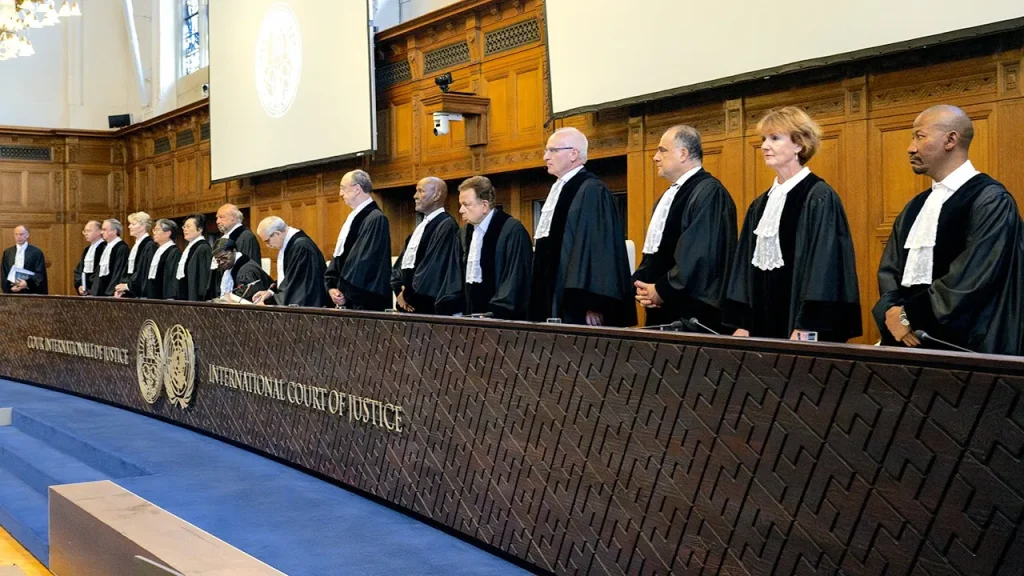ICJ Ruling on Israel and UNRWA: A Controversial Decision
In a significant development at The Hague, the International Court of Justice (ICJ) issued a non-binding ruling that Israel must cooperate with the United Nations Relief and Works Agency for Palestine Refugees in the Near East (UNRWA), despite serious allegations linking the agency to Hamas. This controversial decision comes amid ongoing tensions in the Middle East and has prompted strong reactions from legal experts, Israeli officials, and the current U.S. administration. ICJ President Yuji Iwasawa declared that Israel “is under the obligation to agree to and facilitate relief schemes provided by the United Nations and its entities, including UNRWA,” a statement that has intensified debate about the role of international organizations in conflict zones.
The ruling has been met with sharp criticism from prominent legal scholars who question both its authority and implications. Eugene Kontorovich, who directs the Center for International Law in the Middle East at George Mason University’s Scalia Law School, emphasized that the opinion lacks legal authority, describing it as “not a decision of case.” More concerning to Kontorovich is the precedent this sets: “The ICJ claims it has ‘moral authority,’ but it must be high on its own supply. The Court concluded that UNRWA is a neutral, legitimate aid agency despite its members having participated in Hamas’s October 7 invasion, and the broad infiltration of its facilities and organization by Hamas.” This assessment highlights the fundamental controversy surrounding UNRWA, an organization that the United States had previously stopped funding due to its alleged ties to terrorism. Kontorovich further warned that such rulings could eventually impact American interests by potentially forcing the U.S. to work with organizations it wishes to disengage from.
Israeli officials responded with unequivocal rejection of the ICJ’s opinion. The Israeli Foreign Ministry characterized the ruling as “entirely predictable” and “another political attempt to impose political measures against Israel under the guise of ‘International Law.'” Their statement directly addressed the core concern regarding UNRWA: “Today’s ICJ advisory opinion should have called out the terrorist activity that UNRWA has been involved in: UNRWA employees directly took part in the October 7th massacre and continue to assist Hamas’s terrorist operations – all under the auspices of the United Nations.” This position reflects Israel’s longstanding concerns about UNRWA’s operations in Gaza, particularly following the devastating Hamas attack on October 7, 2023, which triggered the current conflict. The Israeli response underscores the tension between humanitarian aid operations and security concerns in complex conflict environments.
The U.S. State Department added its voice to those criticizing the ruling, posting on social media that it represented “another corrupt ruling by the ICJ.” The statement contrasted the court’s action with ongoing diplomatic efforts: “As President Trump and Secretary Rubio work tirelessly to bring peace to the region, this so-called ‘court’ issues a nakedly politicized non-binding ‘advisory opinion’ unfairly bashes Israel and gives UNRWA a free pass for its deep entanglement with and material support for Hamas terrorism.” This forceful condemnation reflects the current administration’s position on both the ICJ and UNRWA, suggesting that the U.S. views the ruling as potentially undermining peace efforts in the region rather than supporting humanitarian goals.
In stark contrast to these criticisms, United Nations Secretary-General António Guterres urged Israel to comply with the ICJ ruling, stating through a spokesperson that “We are counting on the Government of Israel to abide by its legal obligations.” This response highlights the significant division between the UN leadership’s perspective and those of Israel and its supporters. When confronted with Israeli UN Ambassador Danny Danon’s characterization of the ruling as “shameful,” Guterres’ spokesperson declined to engage with what they termed “rhetoric,” further illustrating the diplomatic tension surrounding the issue. This exchange reflects broader disagreements about the proper role of international institutions in the Israeli-Palestinian conflict.
The controversy over UNRWA extends beyond this specific ruling. Anne Bayefsky, Director of the Touro Institute on Human Rights and the Holocaust, placed the decision in a broader context of what she views as systematic bias, stating, “The ICJ – pompously called the ‘World Court’ – is a creature of the United Nations, an institution riddled with antisemitism and bias against the Jewish state.” This perspective aligns with previous reports indicating that UNRWA should be excluded from Gaza reconstruction efforts due to its alleged employment of Hamas terrorists. The fundamental question remains whether organizations like UNRWA can effectively serve humanitarian needs while maintaining neutrality in one of the world’s most contentious conflicts. As this debate continues, the non-binding nature of the ICJ ruling means its practical impact will largely depend on diplomatic pressures and the evolving situation on the ground in Gaza.














